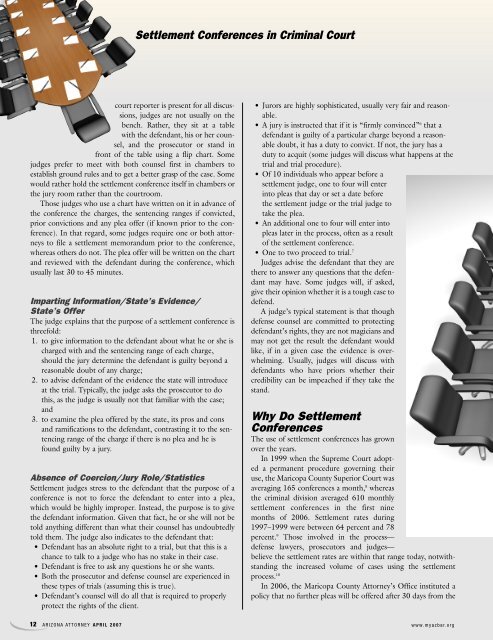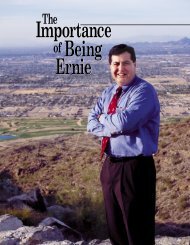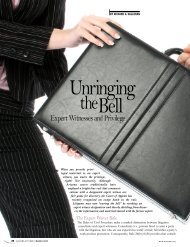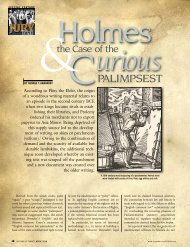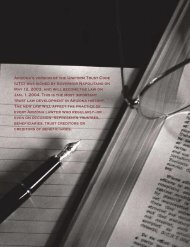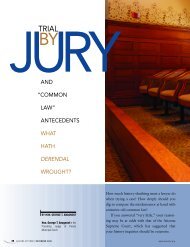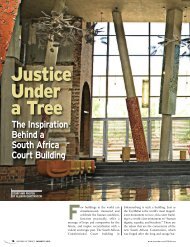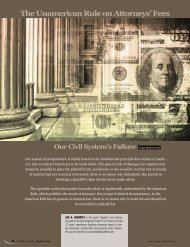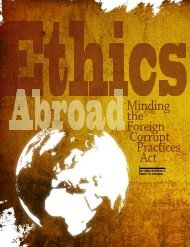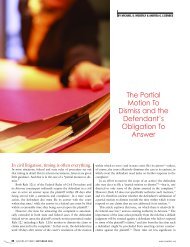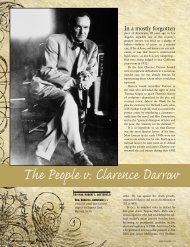Settlement Conferences in Criminal Court - Lawyers
Settlement Conferences in Criminal Court - Lawyers
Settlement Conferences in Criminal Court - Lawyers
- No tags were found...
Create successful ePaper yourself
Turn your PDF publications into a flip-book with our unique Google optimized e-Paper software.
<strong>Settlement</strong> <strong>Conferences</strong> <strong>in</strong> Crim<strong>in</strong>al <strong>Court</strong>court reporter is present for all discussions,judges are not usually on thebench. Rather, they sit at a tablewith the defendant, his or her counsel,and the prosecutor or stand <strong>in</strong>front of the table us<strong>in</strong>g a flip chart. Somejudges prefer to meet with both counsel first <strong>in</strong> chambers toestablish ground rules and to get a better grasp of the case. Somewould rather hold the settlement conference itself <strong>in</strong> chambers orthe jury room rather than the courtroom.Those judges who use a chart have written on it <strong>in</strong> advance ofthe conference the charges, the sentenc<strong>in</strong>g ranges if convicted,prior convictions and any plea offer (if known prior to the conference).In that regard, some judges require one or both attorneysto file a settlement memorandum prior to the conference,whereas others do not. The plea offer will be written on the chartand reviewed with the defendant dur<strong>in</strong>g the conference, whichusually last 30 to 45 m<strong>in</strong>utes.Impart<strong>in</strong>g Information/State’s Evidence/State’s OfferThe judge expla<strong>in</strong>s that the purpose of a settlement conference isthreefold:1. to give <strong>in</strong>formation to the defendant about what he or she ischarged with and the sentenc<strong>in</strong>g range of each charge,should the jury determ<strong>in</strong>e the defendant is guilty beyond areasonable doubt of any charge;2. to advise defendant of the evidence the state will <strong>in</strong>troduceat the trial. Typically, the judge asks the prosecutor to dothis, as the judge is usually not that familiar with the case;and3. to exam<strong>in</strong>e the plea offered by the state, its pros and consand ramifications to the defendant, contrast<strong>in</strong>g it to the sentenc<strong>in</strong>grange of the charge if there is no plea and he isfound guilty by a jury.Absence of Coercion/Jury Role/Statistics<strong>Settlement</strong> judges stress to the defendant that the purpose of aconference is not to force the defendant to enter <strong>in</strong>to a plea,which would be highly improper. Instead, the purpose is to givethe defendant <strong>in</strong>formation. Given that fact, he or she will not betold anyth<strong>in</strong>g different than what their counsel has undoubtedlytold them. The judge also <strong>in</strong>dicates to the defendant that:• Defendant has an absolute right to a trial, but that this is achance to talk to a judge who has no stake <strong>in</strong> their case.• Defendant is free to ask any questions he or she wants.• Both the prosecutor and defense counsel are experienced <strong>in</strong>these types of trials (assum<strong>in</strong>g this is true).• Defendant’s counsel will do all that is required to properlyprotect the rights of the client.• Jurors are highly sophisticated, usually very fair and reasonable.• A jury is <strong>in</strong>structed that if it is “firmly conv<strong>in</strong>ced” 6 that adefendant is guilty of a particular charge beyond a reasonabledoubt, it has a duty to convict. If not, the jury has aduty to acquit (some judges will discuss what happens at thetrial and trial procedure).• Of 10 <strong>in</strong>dividuals who appear before asettlement judge, one to four will enter<strong>in</strong>to pleas that day or set a date beforethe settlement judge or the trial judge totake the plea.• An additional one to four will enter <strong>in</strong>topleas later <strong>in</strong> the process, often as a resultof the settlement conference.• One to two proceed to trial. 7Judges advise the defendant that they arethere to answer any questions that the defendantmay have. Some judges will, if asked,give their op<strong>in</strong>ion whether it is a tough case todefend.A judge’s typical statement is that thoughdefense counsel are committed to protect<strong>in</strong>gdefendant’s rights, they are not magicians andmay not get the result the defendant wouldlike, if <strong>in</strong> a given case the evidence is overwhelm<strong>in</strong>g.Usually, judges will discuss withdefendants who have priors whether theircredibility can be impeached if they take thestand.Why Do <strong>Settlement</strong><strong>Conferences</strong>The use of settlement conferences has grownover the years.In 1999 when the Supreme <strong>Court</strong> adopteda permanent procedure govern<strong>in</strong>g theiruse, the Maricopa County Superior <strong>Court</strong> wasaverag<strong>in</strong>g 165 conferences a month, 8 whereasthe crim<strong>in</strong>al division averaged 610 monthlysettlement conferences <strong>in</strong> the first n<strong>in</strong>emonths of 2006. <strong>Settlement</strong> rates dur<strong>in</strong>g1997–1999 were between 64 percent and 78percent. 9 Those <strong>in</strong>volved <strong>in</strong> the process—defense lawyers, prosecutors and judges—believe the settlement rates are with<strong>in</strong> that range today, notwithstand<strong>in</strong>gthe <strong>in</strong>creased volume of cases us<strong>in</strong>g the settlementprocess. 10In 2006, the Maricopa County Attorney’s Office <strong>in</strong>stituted apolicy that no further pleas will be offered after 30 days from the12 ARIZONA ATTORNEY APRIL 2007www.myazbar.org


